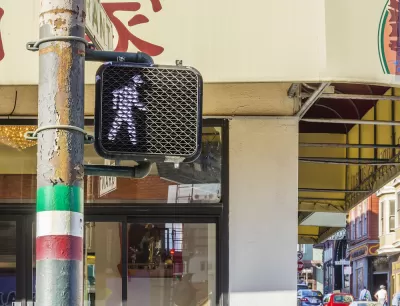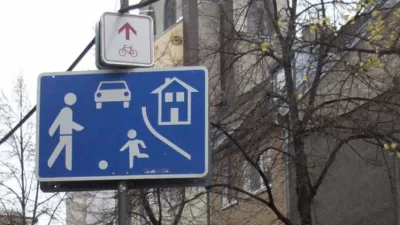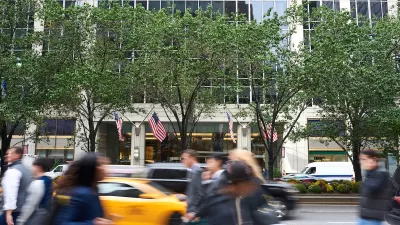Supporters of decriminalization argue that jaywalking laws don’t keep pedestrians safe and disproportionately burden Black and brown communities with fines.

As Jenni Bergal writes in an article for Stateline, some states are reconsidering jaywalking laws, fueling a fierce debate over the laws’ effectiveness and equity. According to Mike McGinn, executive director of America Walks, “[Enforcing jaywalking laws] doesn’t really improve safety. It’s part of a culture of blaming pedestrians.” Moreover, McGinn points out, “it’s used to make pretextual police stops that impinge on the ability of people to move about without being stopped, particularly in Black and brown communities.”
Thanks to arguments like these, “In the past two years, a few states have moved away from strict enforcement of jaywalking laws, making it easier for pedestrians to cross the street outside of a crosswalk or against a traffic signal without getting cited by police.”
Some critics disagree. “[A]t a time when pedestrian deaths are on the rise, opponents of decriminalization say police should be able to issue citations to discourage people from putting their lives in danger.”
Others say pedestrian safety is a matter of infrastructure, not individual behavior. “[T]he Insurance Institute for Highway Safety, a nonprofit research group funded by auto insurance companies, said the answer isn’t to go after jaywalkers; it’s to change the design of streets.” According to McGinn, “The real issue is that we need to design our streets so cars move slowly and carefully and we prioritize the safety of the people walking in their neighborhoods and business districts.”
The article details the recent legislation decriminalizing jaywalking in states like Nevada and Virginia, as well as the effort to pass a similar law in California.
FULL STORY: Racial Justice, Pedestrian Safety Fuel Jaywalking Debate

Alabama: Trump Terminates Settlements for Black Communities Harmed By Raw Sewage
Trump deemed the landmark civil rights agreement “illegal DEI and environmental justice policy.”

Study: Maui’s Plan to Convert Vacation Rentals to Long-Term Housing Could Cause Nearly $1 Billion Economic Loss
The plan would reduce visitor accommodation by 25% resulting in 1,900 jobs lost.

Planetizen Federal Action Tracker
A weekly monitor of how Trump’s orders and actions are impacting planners and planning in America.

Restoring Northern India’s Himalayan ‘Water Temples’
Thousands of centuries-old buildings protect the region’s natural springs and serve as community wells and gathering places.

Milwaukee to Double Bike Share Stations
Bublr Bikes, one of the nation’s most successful, will add 500 new e-bikes to its system.

DC Extends Application Window for Outdoor Dining Permits
District restaurants will have until the end of November to apply, but businesses with permits in rush hour parking lanes must end operations on July 31.
Urban Design for Planners 1: Software Tools
This six-course series explores essential urban design concepts using open source software and equips planners with the tools they need to participate fully in the urban design process.
Planning for Universal Design
Learn the tools for implementing Universal Design in planning regulations.
Caltrans
Smith Gee Studio
Institute for Housing and Urban Development Studies (IHS)
City of Grandview
Harvard GSD Executive Education
Toledo-Lucas County Plan Commissions
Salt Lake City
NYU Wagner Graduate School of Public Service





























